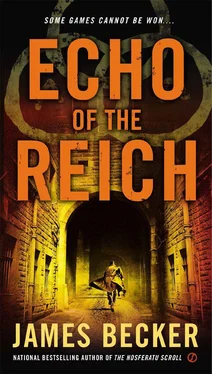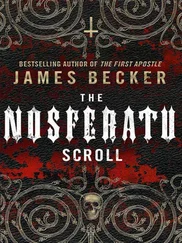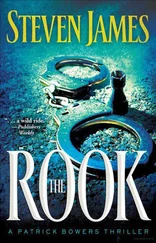James Becker - Echo of the Reich
Здесь есть возможность читать онлайн «James Becker - Echo of the Reich» весь текст электронной книги совершенно бесплатно (целиком полную версию без сокращений). В некоторых случаях можно слушать аудио, скачать через торрент в формате fb2 и присутствует краткое содержание. Жанр: Триллер, на английском языке. Описание произведения, (предисловие) а так же отзывы посетителей доступны на портале библиотеки ЛибКат.
- Название:Echo of the Reich
- Автор:
- Жанр:
- Год:неизвестен
- ISBN:нет данных
- Рейтинг книги:3 / 5. Голосов: 1
-
Избранное:Добавить в избранное
- Отзывы:
-
Ваша оценка:
- 60
- 1
- 2
- 3
- 4
- 5
Echo of the Reich: краткое содержание, описание и аннотация
Предлагаем к чтению аннотацию, описание, краткое содержание или предисловие (зависит от того, что написал сам автор книги «Echo of the Reich»). Если вы не нашли необходимую информацию о книге — напишите в комментариях, мы постараемся отыскать её.
Echo of the Reich — читать онлайн бесплатно полную книгу (весь текст) целиком
Ниже представлен текст книги, разбитый по страницам. Система сохранения места последней прочитанной страницы, позволяет с удобством читать онлайн бесплатно книгу «Echo of the Reich», без необходимости каждый раз заново искать на чём Вы остановились. Поставьте закладку, и сможете в любой момент перейти на страницу, на которой закончили чтение.
Интервал:
Закладка:
He paused and ran the beam of his flashlight around the room.
“It’s difficult to tell how many bodies are in here,” he said, “but I think it’s more than twenty. My guess is that there are at least thirty, maybe forty of them. I suppose you could say that it’s just another example of Nazi efficiency. When you link that to their total disregard for human life, you get a pretty frightening combination. The only good thing is that we now definitely know that we’re in the right place.”
Bronson pushed the door closed on the silent room and its long-dead occupants and slid home one of the bolts to secure it.
“Can you imagine what those poor souls must have felt like,” Angela said, her voice quiet and subdued, “locked in that room and probably knowing that they had just minutes to live? Wondering if they would be shot or bayoneted or simply left there to die of thirst and starvation.”
“At least it was quick,” Bronson muttered, “but they probably died screaming in terror. Those that survived the blast of that grenade would have been begging for death. The explosion in that confined space would have done terrible things to their bodies. So I hope their souls found some peace.”
Angela dabbed at her eyes with a tissue and glanced over at his dark shape as they walked down the corridor together, heading further into the mine.
“That’s very deep for you, almost religious,” she said. You feeling all right?”
“Yeah. It’s just that it’s one thing to read in a history book that the Nazis killed God knows how many millions of people, and you completely understand that on an intellectual level, but it’s just facts, you know, just numbers. But then, when you actually see the bodies-or rather the bones-it brings it home to you. I’ve never seen hard and unarguable evidence of a Nazi atrocity before. It just makes everything so much more real.”
“Yes. And those poor souls wouldn’t even have been listed among the dead. That was a secret atrocity, if you like, one nobody was ever supposed to know about. It makes you wonder how many other piles of bones are still out there somewhere, in some underground chamber or wherever, waiting patiently to be found so that another unfinished chapter about that war can finally be completed.”
Their lights danced ahead of them as they walked steadily down the corridor, the beams illuminating the bare stone walls and the concrete floor. They passed numerous chambers, all of them, with the exception of the charnel house they’d investigated, with their doors standing wide-open. They looked in every one, but saw only a virtual repeat of the first few offices they’d checked: papers scattered everywhere, chairs and desks displaying signs of a hasty departure.
The only rooms that were different were a canteen or dining room, the chairs and tables thick with dust, a serving counter at one end, and a couple of washrooms-male and female-equipped with sinks and toilet stalls.
Then Angela spotted another closed door-in fact, a pair of double doors-though these weren’t bolted, just pushed shut.
Bronson pulled them open, and they found themselves looking down a separate wide passageway that led off the corridor they’d been following. At the far end, facing them, was a further pair of double doors, standing slightly ajar. On the left-hand side of the passageway were two more doors, and another one was set into the right-hand wall.
“You said the Bell was pretty big,” Bronson remarked, “so maybe that’s the chamber it was positioned in, down at the end of this corridor.”
“Could be. Let’s take a look.”
Angela strode down the passage, Bronson right beside her. At the end, he pulled the doors open and they stepped into a chamber that was completely different from any that they’d seen before.
It had a significantly higher ceiling than all the others they’d explored, probably twelve or fifteen feet above their heads, and was almost circular. But that wasn’t what made them stop in their tracks. Almost directly in front of them, a pair of skeletons lay against the wall, the bones in two untidy heaps below the numbers “3” and “4” that had been painted on the wall.
“What the hell happened here?” Angela asked.
“I’ve no idea,” Bronson replied, striding across the room to examine the grisly remains. He stared down at the skeletons. Some connective tissue and tendons had survived, along with a few patches of skin, and on one corpse part of the skull still bore skin and a few strands of fine wispy hair. Rusty chains dangled above them from rings secured to the wall.
“I don’t know who these two were,” he said, glancing back at Angela, “but they were chained up here.”
He pointed to one of the dangling chains, at the end of which was a handcuff, one skeletal wrist still secured by it. The corpse’s other arm had apparently dropped free of its steel support at some point after the victim’s death.
“And they were probably naked,” he added, “because I can’t see any evidence of clothing anywhere near them. Some of their skin has survived, so if they had been wearing clothes, I would have expected some scraps to still be visible. From the look of the pelvis region, I’d say they were both male. Other than that, I’ve got no idea what went on in this room.”
He shone his flashlight at the walls, which were different from those in the rest of the complex, and not just because they were circular.
“That’s odd. Why did they line this chamber with bricks? Weren’t the stone walls enough?”
“Obviously not.”
Angela walked over to a section of the wall well away from the two skeletons and examined the brickwork carefully. She tapped one of the bricks with her fist, then rubbed the surface with her fingertip.
“I’m not a bricklayer, obviously,” she said, “but I don’t think these are normal bricks, not like the ones we use today, anyway.”
Bronson had also been looking at the bricks, and nodded agreement.
“You’re right,” he said. “They’ve got a kind of glaze on them.”
He took out his multi-tool, opened the knife blade and scratched the surface of a brick.
“It’s not made of the usual material either. In fact, I think they’re probably some sort of ceramic.”
“Ceramic? Why would they need to line the chamber with ceramic bricks?”
“Against excessive heat, maybe. The underside of the American Space Shuttle has a layer of ceramic tiles on it, to protect it against the heat of re-entry into the atmosphere.”
Bronson paused and shook his head.
“No, that doesn’t make sense. If the Bell was generating so much heat that it was damaging the walls of this chamber, it would also fry anybody in here.”
“According to the reports, several of the scientists on the project died.”
“Yes, but it can’t have been from heat. If that had been the case, those two skeletons”-he pointed at the opposite wall-“wouldn’t be here. To damage the walls would mean it would have to get as hot in here as in the incineration chamber in a crematorium, and all that would leave would be a couple of piles of dust and ash. No, it wasn’t heat they were worried about. It was something else.”
“Radiation, maybe?” Angela suggested.
“That sounds a lot more likely to me, though I have no idea what kind of radiation would need ceramic bricks to absorb it. And maybe they didn’t know either.”
“What do you mean?”
“Whatever happened in this chamber was brand-new technology. As far as we know, nothing like the Bell had been constructed before, so they were treading completely new and unknown ground. Maybe they realized it was radiating something, and using ceramic bricks was their first attempt to contain it. If they’d been able to continue their research, they might have eventually switched over to lead sheets or to something entirely different.”
Читать дальшеИнтервал:
Закладка:
Похожие книги на «Echo of the Reich»
Представляем Вашему вниманию похожие книги на «Echo of the Reich» списком для выбора. Мы отобрали схожую по названию и смыслу литературу в надежде предоставить читателям больше вариантов отыскать новые, интересные, ещё непрочитанные произведения.
Обсуждение, отзывы о книге «Echo of the Reich» и просто собственные мнения читателей. Оставьте ваши комментарии, напишите, что Вы думаете о произведении, его смысле или главных героях. Укажите что конкретно понравилось, а что нет, и почему Вы так считаете.












